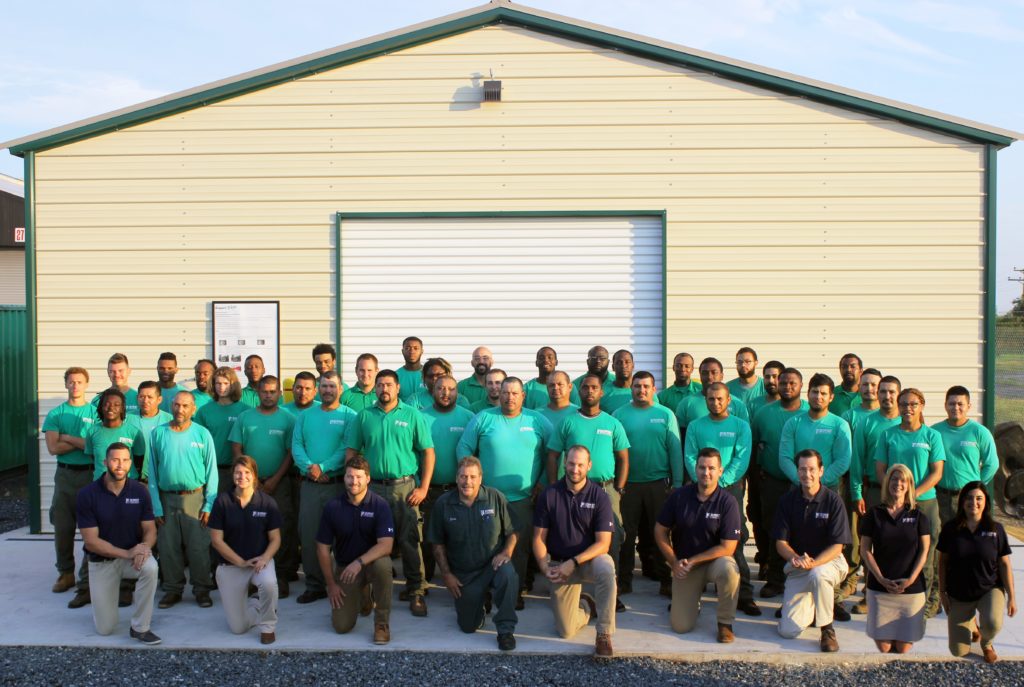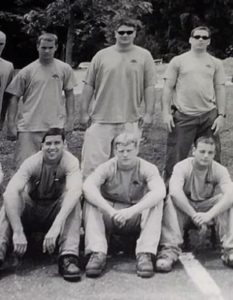 An Interview with Mike Fleming about his Williamson College Experience
An Interview with Mike Fleming about his Williamson College Experience
Among the many respected colleges and universities across the country from which we gladly accept applicants, one school stands out—not only because it’s a trade school, but because of their unique approach to teaching discipline and hard work. To learn more about what sets Williamson College of the Trades apart, we sat down with alumni Mike Fleming, branch manager in our Baltimore, MD landscape management branch, to learn about his unique college experience and how it helped shape his career.
Pictured right: Mike Fleming (bottom left) with the horticulture class his freshman year.
Q: When did you attend Williamson College? What was your major/field of study? What degree did you earn?
A: I started in the fall of 2003 studying horticulture, landscape and turf management, and graduated in the summer of 2006 with an associate’s degree in specialized technology degree.
Q: Can you give us a little insight into how Williamson is different from traditional colleges or trades schools?
 A: For those unfamiliar with Williamson, it is a private all-male school founded in 1888 by a Quaker from Philadelphia who witnessed underprivileged or fatherless young men roaming the streets aimlessly. He came up with the idea to give these young men a sense of direction in their life and an opportunity to become productive and respected members of society. It was a school that not only taught you a skill, it taught you discipline, hard work, and values—very similar to Ruppert. (For more on the history of Williamson College, visit: https://www.williamson.edu/about/)
A: For those unfamiliar with Williamson, it is a private all-male school founded in 1888 by a Quaker from Philadelphia who witnessed underprivileged or fatherless young men roaming the streets aimlessly. He came up with the idea to give these young men a sense of direction in their life and an opportunity to become productive and respected members of society. It was a school that not only taught you a skill, it taught you discipline, hard work, and values—very similar to Ruppert. (For more on the history of Williamson College, visit: https://www.williamson.edu/about/)
The daily routine at Williamson (at least in my day) went as follows:
- 5:00 AM: Wake up, shave, press your uniform (a button-down oxford and dress slacks), and shine your dress shoes. Clean your room—you must have 90-degree “hospital corners” on your bed, sweep the floor, dust the furniture, and display all contents on your desk.
- 6:00 AM: Report to AM inspection to salute the flag. There was a prefect who inspected you to confirm that you shaved, pressed your uniform, shined your shoes, and had your shirt tucked in. If you were late or failed inspection, you received merit hours—this was how many hours you had to perform duties on the following Saturday maintaining the school grounds by painting, mowing, stocking the kitchen, painting the football field, or cleaning roadkill off of the campus (no kidding—I was granted 32 merit hours my freshman year and once had to clear a dead deer out of a field.)
- 6:45 AM: Breakfast
- 7:00 AM: Chapel
- 7:45 AM -12:00 PM: Classroom
- 12:00 – 1:00 PM: Lunch
- 1:00 – 5:00 PM: Field practices (mowing the campus, building patios, weeding the bricks by hand, etc.)
- 5:00 – 5:45 PM: Dinner (freshmen had to serve dinner and clean the cafeteria at commencement for a week 2X per year)
- 6:00 – 8:00 PM: Football practice
- 8:00 – 10:00 PM: Study hall
- 10:00 PM: Lights out
There was zero tolerance if you were late, looked sloppy or performed haphazard work, and there were corresponding consequences. Although this military-style strictness may seem harsh to some, it truly helped instill standards, routine, and discipline, all of which I am proud to carry with me today.
Q: Did you have a favorite professor? If so, who and how did they influence you?
A: My favorite professor was the head of the horticulture program, Mr. Norton. He always told us that nothing in life comes easy, and if anything does come easy then it’s probably not worth it—enjoy your sweat because hard work doesn’t guarantee success, but without it you don’t stand a chance.
Q: What was the most important/impactful thing you learned during your time there?
A: It sounds silly, but it’s a simple one: hard work works.
Q: How did your time at Williamson lead you to join Ruppert?
 A: When Mike Monde came to Williamson to give a presentation, there was no doubt in my mind that this was the place I wanted to work—Ruppert’s values are my values. I joined the company upon graduation in 2006 as assistant field manager in the Toughkenamon, PA branch and over the past 13 years, I’ve worked my way up to field manager, area manager, and now branch manager in our Baltimore, MD branch. The skills and discipline that I learned at Williamson College have served me well throughout my career and have helped shape my leadership style.
A: When Mike Monde came to Williamson to give a presentation, there was no doubt in my mind that this was the place I wanted to work—Ruppert’s values are my values. I joined the company upon graduation in 2006 as assistant field manager in the Toughkenamon, PA branch and over the past 13 years, I’ve worked my way up to field manager, area manager, and now branch manager in our Baltimore, MD branch. The skills and discipline that I learned at Williamson College have served me well throughout my career and have helped shape my leadership style.
Picture right: Mike Fleming (bottom left) with his team at the Baltimore, MD landscape management branch.
Q: Why do you think it’s important for students to consider trade schools like Williamson as a viable alternative to traditional colleges/universities?
A: I think it’s important for everyone to follow their passion first and foremost, no matter what it is, but there will always be a need for skilled trades. Trades are what create and maintain the world we live in and these positions will always be in demand.
 An Interview with Mike Fleming about his Williamson College Experience
An Interview with Mike Fleming about his Williamson College Experience